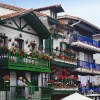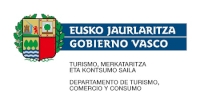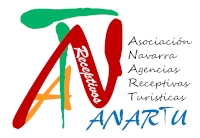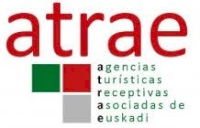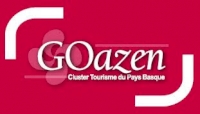
THE ROADS OF THE KINGDOM CIRCUIT
Information
This circuit will tell us the history of the ancient Kingdom of Navarra through culture, gastronomy and nature. The prelude is the kingdom of Pamplona, which was established as a distinct political entity at the beginning of the 9th century and reached its maximum human and territorial splendor with the reign of Sancho III the Elder (1004–1035) during the first third of the 11th century.
It was Sancho VI the Wise (1150-1194) who led the change of name from the kingdom of Pamplona to the kingdom of Navarra, at which time we can already speak of a structure, in a modern way, of the State. The capital was established mainly in Pamplona. During his reign, the name of the Basque language also appeared as “lingua navarrorum”.
Reception in Pamplona and transfer to the hotel. Accommodation. Free food. In the afternoon, walk through the historical case of Pamplona. Dinner at the Gastronomic Society with explanation of the program. This dinner will be paid for by all, as is the local custom.
Breakfast and departure to learn about the history of the Kingdom of Pamplona, embryo of the Kingdom of Navarra, through the territories that today occupy the Basque Autonomous Community, La Rioja and Navarra. Our route will be the Camino de Santiago surrounded by vineyards.
First, we will enter La Rioja, visiting the Monasteries of Suso and Yuso, where we will see the first writings in the Spanish and Basque languages. Later in Nájera we will visit the Pantheon of the Kings of Pamplona, in the Monastery of Santa María La Real. Lunch. We will continue to Laguardia, in the Basque Autonomous Community, an old defensive castle built on the borders of the kingdom of Navarre in the 10th century. Return to Pamplona and accommodation.
Breakfast and departure through the Pamplona Basin to make a brief stop in Etxauri. Continuation through Salinas de Oro. Navarra town of “Tierra Estella”, nestled in the foothills of the Urbasa and Andía Natural Park, is one of the few spring salt productions that remain active. We will continue to the Monastery of Santa María de Irantzu, hidden in the green valley of Yerri, in a secluded area between mountains, a great Cistercian abbey built between the 12th and 14th centuries. After your visit we will continue our trip to Estella. Visit and lunch.
Although some archaeological remains have been found in its term that take us back to the Bronze Age, Estella-Lizarra dates its birth in the year 1090, when King Sancho Ramírez granted it his Jurisdiction, that is, a series of rules in which It tried to privilege the settlement of settlers, of French origin, who would allow the economic diversification of the kingdom and take advantage of the importance that the pilgrimage to Santiago de Compostela was reaching at this time.
In the afternoon we will visit Puente la Reina, "crossroads", a medieval town where the two main routes of the Camino de Santiago merge, it is one of the most meaningful enclaves of Compostela in Navarra. We will go to Santa María de Eunate. Octagonal building dedicated to Santa María that was built during the reign of Sancho el Sabio, in the second half of the 12th century, around 1170, although there are those who extend a little longer in time, around 1210. According to the existing documentation, the mentor and the creator of this beautiful work was a queen, to whom they attribute the name of Doña Sancha. Returning to Pamplona, we will pass through Obanos, which in the 13th century was erected as a banner in the fight against the abuse of certain Navarrese nobles, since it was the headquarters of the Junta de los Infanzones.
Breakfast and departure at noon to visit Olite and its Palace first. The Royal Palace of Olite is proof of the courtly splendor that the city of Olite lived during the Middle Ages, a historic town located in the Middle Zone of Navarra, 42 kilometers south of Pamplona. Declared a National Monument in 1925, it occupies a third of the medieval urban area and is considered one of the most interesting Gothic civil ensembles in Europe. We will continue our visit to the Cerco de Artajon, where one of the most important fortifications of Medieval Navarre is located in its highest part. The Cerco de Artajona is a walled enclosure with an irregular perimeter dating from the 11th century and made up of 14 crenellated towers of which nine are still standing.
We will arrive at the Roman city of Andelos, in Mendigorria, where there was a human settlement dating back to the 4th-3rd centuries BC. It is possible that from the 2nd century BC the first contacts between the Basques and the Roman world were established. The 1st and 2nd centuries AD are the most splendid in the city. It is at this time when an important urban development takes place and the installation of the complex hydraulic system is carried out. This city remained an inhabited place until late medieval times, conserving the hermitage of Nuestra Señora de Andión as the only element that survives today.
Arrival in Pamplona at noon and lunch. Continuation to San Sebastián. In the afternoon, walking or panoramic tour of the city (depending on the composition of the group): Peine del Viento, Miramar Palace, Paseo Nuevo, Boulevard, Hotel María Cristina, Kursaal,… return to the hotel and accommodation.
Breakfast and departure to Pasajes de San Pedro, where we will visit the Mater Ship-Museum and learn about the traditional Basque fishing arts. We will go by boat to Pasajes de San Juan, where we will visit Victor Hugo's house.
We will continue to Hondarribia, where we will learn about its important cultural and artistic heritage, inheritance of a rich history. Its walls, most of them standing and in a constant process of recovery, give it a special appearance, evoking an epic past and permeating every corner, alley, and plaza with aromas, flavors and sounds that transport us to other times. Lunch in Hondarribia.
We will continue our journey crossing to Hendaia on the sea line that joins these two towns. Brief visit to Hendaia, with its 3 km long sandy beach, which is the largest in the entire Basque Country. Return to San Sebastián and free time.
Breakfast and departure to visit the Basque Coast. First, we will visit Biarritz, known for its famous beaches, its therapeutic waters and its surf scene, it is a place where luxury restaurants and spas coexist in harmony with quiet pizza stalls and surf shops. The city is made up mostly of bourgeois houses and mansions, used by the wealthiest as summer houses. This touch of luxury is perfectly balanced with the more relaxed and carefree surf culture, which also has a long tradition in Biarritz. Without a doubt, this interesting contrast is part of the identity of the city.
Later we will approach Baiona, located in the northernmost point of the French Basque Country, where the rivers Nive / Errobi and Adur / Aturri join, is the urban center of Bayonne (“Baiona” in Basque). Thanks to the Adur river that connects Bayonne with the Bay of Biscay, the city has benefited throughout its history from a strategic commercial position. Baiona grew thanks to the whale and cod fishing industry, as well as thanks to the Basque sailors who returned from distant lands with spices and other riches. This influx of money financed many of the city's buildings, including its imposing Gothic cathedral. Lunch.
We will finish the visit in Saint Jean de Luz, where we will see many of the buildings dating from the 17th century, a time when Saint Jean de Luz was one of the most important fishing ports in France. Although the seventeenth century was a time of transition, when the main economic activity went from fishing to what was essentially piracy, as the town became the base for Basque corsairs. These corsairs pursued the enemies of France at sea, plundering them with the king's blessing. Return to San Sebastián and free time.
Today we leave Donostia / San Sebastián to enter the heart of Gipuzkoa. We will first visit the famous town of Ordizia, an international reference in gastronomy for its famous blood sausages (a very important contest is held for this reason) and its famous Wednesday market.
We will continue our journey through the magical and suggestive Aralar Natural Park. With its limestone massifs, its rivers and springs, rich vegetation and fauna, with its myths and legends, it captivates locals and strangers, which is framed in one of the most important mountainous areas in terms of altitude, extension, land uses and natural values
Lunch in the La Sakana Valley and continuation to Pamplona. Accommodation at the hotel and rest. In the middle of the afternoon, walk through the historical case of Pamplona. Visit of the old Iruñea (Pamplona), the old Basque capital; Las Murallas, Palacio de Los Reyes, its medieval streets in the old town, and the evolution of the city beyond the walls, etc ... Rest before going out to dinner at a gastronomic society. Dinner not included that will be paid by all, as is the custom.
Breakfast and then we head towards Las Bardenas Reales. From Nuestra Señora del Yugo we will have an impressive panoramic view of this spectacular Biosphere Reserve Natural Park. Continuation of our trip through the Ribera until we reach Tudela, the second city in extension and importance of Navarre's foral territory. In this city, Muslims, Jews and Mozarabs lived together for more than 400 years. This coexistence gave the city a cultural miscegenation, which is reflected in its monumental buildings, in its twisted streets, with passageways, walls and watchtowers. Visit and lunch. Return to Pamplona and free time.
Departure from Pamplona to visit the Monastery of Leire, located in the Southeast of Pamplona. An icon of Navarra for the important role it has played in the history of the Kingdom of Navarra. After your visit, we will continue our journey to visit Javier Castle, the birthplace of San Francisco de Javier, co-patron of Navarra. We will continue our journey to the East to reach the medieval town of Ujue / Uxue where we will have lunch. View of the town and its church-fortress. Return to Pamplona and free time.
Departure to Elizondo and visit the capital of the Baztán Valley. We will enjoy its many stately homes and palaces. Its most emblematic building is the baroque palace of Arizkunenea, but there are other artistic monuments of interest such as the town hall, the Datue palace, the viceroy's house or the church of Santiago.
After visiting Elizondo, we will continue to Zugarramurdi. Lunch and free time to visit on your own the Caves and the Museum of the Witches (herbalists, midwives and women in general) who were falsely accused by the Catholic Church of Bruges. Return to Pamplona free time.
Breakfast and free time until the time of departure transfer.
Thursday from March 4, 20217 to March 24, 2022 (see Easter, Christmas and Long weekends).
PRICES
|
Hotel category |
In double room |
Individual room space |
|
Tourist Hotels 3 * |
€ 1,830 / p |
420 € / p |
|
Hotels First 4 * |
€ 2,090 / p |
€ 550 / p |
High Season Spto from July 1 to October 31:
In Tourist Hotels: € 90 / pers
In First Hotels: € 120 / pers
INCLUDE
- Arrival and departure shuttles.
- Transportation throughout the program. According to group in van / minibuses or luxury coaches.
- Accommodation in Double rooms.
- Hotels category 3 * and 4 * according to the chosen option.
- Half Board (except dinner on Day 1), Breakfasts at the hotel and Lunches at local restaurants.
- Entrance and visit to the Monasteries of Suso and Yuso.
- Entrance and visit to the Monastery of Santa María La Real in Nájera.
- Visit to Etxauri, Salinas de Oro, Sana María de Irantzu Monastery, Puente La Reina and Eunate.
- Guided visit to the Mater Ship-Museum.
- Guided visit to the historic center of Pasajes de San Juan
- Entrance to the Victor Hugo House-Museum.
- Passage by motorboat from Pasajes de San Pedro to Pasajes de San Juan.
- Passage by boat from Hondarribia to Hendaia.
- Visit to the Ordizia Interpretation Center.
- Walking tour of the historic center of Pamplona.
- Visit and entrance to the Monastery of Leire.
- Visit and entrance to Javier Castle.
- Visit to the Church-Fortress of Uxue.
- Visit to the Castle of Olite.
- Visit to the Cerco de Artajona.
- Accompanying Guide. In the case of groups of less than 15 people, you will be the driver-guide. In some cases we can have local guides and a Spanish-speaking driver-escort.
- Informative material about the trip.
- Telephone assistance 24 hours
- Taxes
DOES NOT INCLUDE
- Dinner on Thursday D1 to be paid for by all.
- Tips or porters.
- All personal expenses such as drinks, tips, laundry, phone calls, etc ...
- Any other expense not specified in the program and not mentioned as included.
- Travel Assistance and Cancellation Insurance.
IMPORTANT NOTES
- Guaranteed departures from 2 adults.
- In the event that a place to visit is closed for any reason, an alternative plan will be made if possible. At no time will any refund be made.
- Sustainable vehicles, respectful with the environment and ecological driving. They comply with the European Euro 6 anti-pollution regulation.
- The guide will enforce the health protocols at all times. In case of non-compliance by any participant, by decision of the guide, he will leave the group and will not have the right to any refund.
- Visits may undergo modifications, both in content and form, due to changes in the entities to be visited, due to weather issues, for reasons beyond our control, or programming adjustments.
- Minors must be accompanied by adults.
- Our Experiences and guided tours are not canceled due to adverse weather conditions. Navarra can offer us a very different climate from one valley to another, even on the same day.
- Do not walk excessively, but it is advisable to bring comfortable closed shoes. Forecast rain according to season.
- Groups with less than 16 people, the visits may vary both in content and in form, having to accommodate / adjust to the regular visits that take place in the places to visit.
NECESSARY MATERIAL
- Being an activity that in total lasts about 8/9 hours, just in case take 2 masks: Either standard (4h) or FFP2 or KN95 (8h) or one of both.
- Hydroalcoholic gel.
- Sunglasses.
- Cap with visor or hat to protect us from the sun.
- Raincoat and / or warm clothing depending on the season.
COVID-19 PROTOCOLS
- We must bear in mind that we are going to rural areas and that we have to respect the established protocols at all times and with great scruples. The local population may have some fear and suspicion that people from outside their territory can carry the virus to them. With which we have to be very respectful with them and with the protocols established by the health authorities.
- We will greet each other without physical contact.
- For your safety and that of everyone, if you have a fever or any symptoms of Covid-19, or if you have been in contact with someone with Covid-19 in the last 14 days, refrain from participating in the activity. No guide will carry out the activity in the same case. Navarra Health Councils 948 290 290, Euskadi 900 203 050, Aragon 976 696 382, La Rioja 941 298 333 and 112 emergency numbers.
- Maintain a safety distance of 1.5 meters between people who do not live together.
- In closed areas or in places where the safety distance of 1.5 meters cannot be maintained, the use of a mask is mandatory.
- Cleaning hands with hydroalcoholic gel very frequently.
- Do not exchange material or share drinks, food, sun creams or lipsticks. What one person has touched, cannot be touched by another without first having been disinfected (if they are not a family unit living together).
- Pamphlets that are visible do not take them. Ask the staff for them.
- The guide will enforce the health protocols at all times. In case of non-compliance by any participant, by decision of the guide, he will leave the group and will not have the right to any refund.
Can't find what you were looking for? Create your own experience. We design a completely different trip adjusted to your liking.
 747424667
747424667
